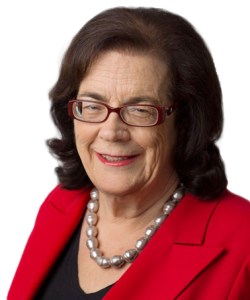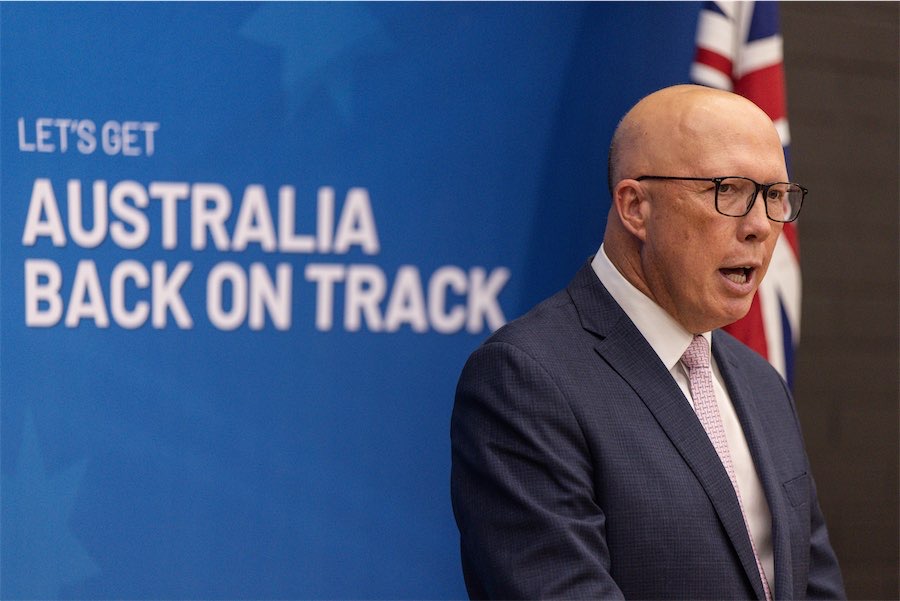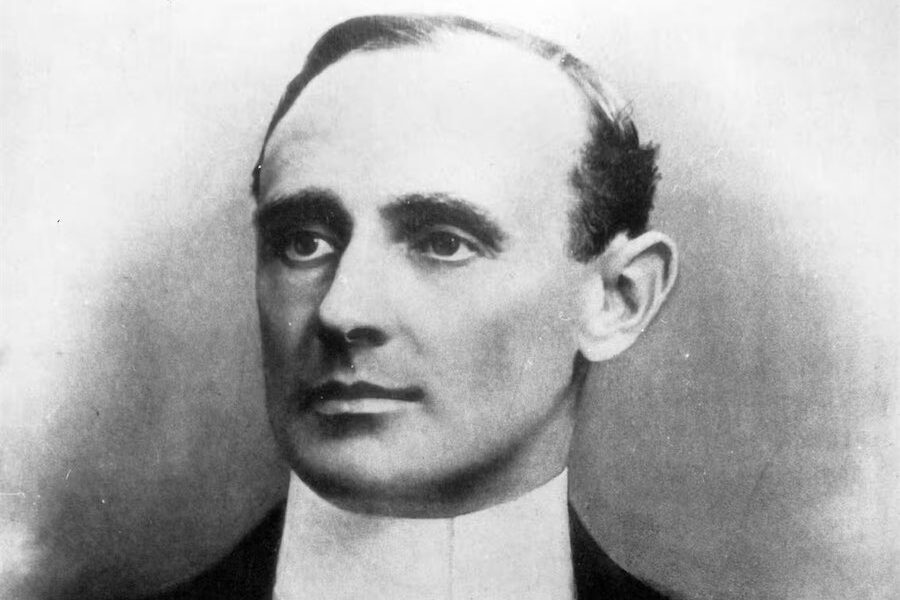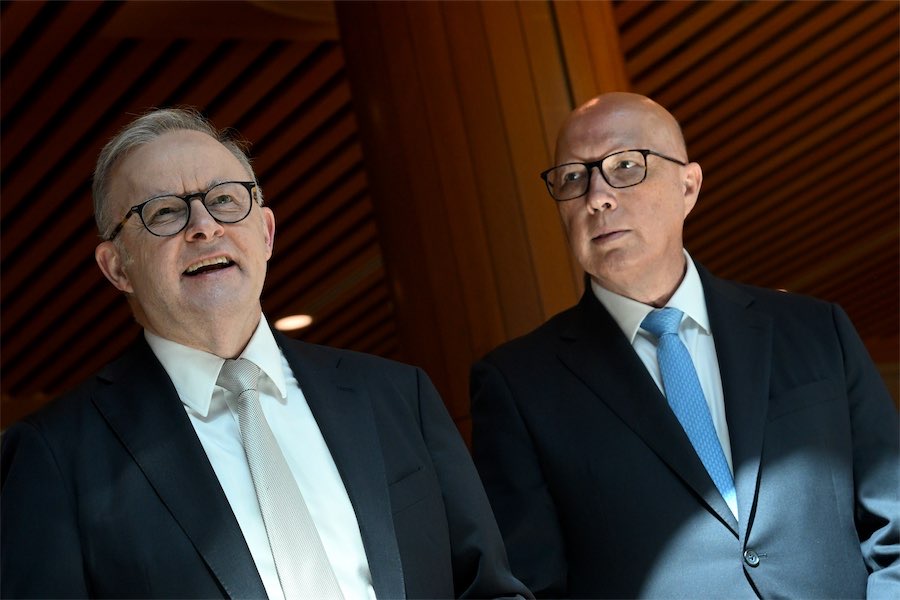THE Liberals have used John Howard extensively during this campaign. These days, they celebrate their party hero as the great winner. He was, however, the last Liberal prime minister to take his party into the wilderness.

There are comparisons and contrasts between 2007 and 2022. In each election the Coalition government was “old” – in 2007 it was seeking a fifth term; now it’s asking for a fourth.
People were “over” Howard, as they’re “over” Scott Morrison. But the feeling against Howard was that he’d had his time – it’s visceral against Morrison.
Kevin Rudd was a fresh face, plugged into the rising issue of the times, climate change. Anthony Albanese often projects more as old Labor than future Labor.
Oh, and interest rates went up by 25 basis points during each campaign – to 6.75 per cent (an 11 year high) in 2007 and to 0.35 per cent in 2022 (still at rock bottom).
Despite Albanese’s campaign hiccups, at the end of this penultimate week, based on the objective evidence, the election appears his to lose.
The Australian newspaper’s YouGov poll, which surveyed almost 19,000 people across all lower house seats between April 14 and May 7, had Labor on track to majority government.
This is not predictive – it’s a snapshot. Both sides know the final campaign days provide risks and opportunities.
A sizeable number of voters have yet to firm up their decisions. In particular, how will soft Liberal voters who are put off by Morrison break? Between those who opt to swallow hard and stick with the government and those who can’t stomach the PM any longer?
But to state the obvious, Morrison has a short time in which to try reduce a big margin. Last minute scare campaigns can play effectively; unexpected developments can change the dynamics. But that’s only if enough voters in the right seats retain an open mind.
The Liberals have left their launch, to be held in Brisbane on Sunday, until the last moment. New policy will be announced. Morrison needs to garner some momentum from it for the home run.
Next week will see the release of important economic data, on unemployment and wages. The government will be hoping the unemployment figure, most recently 4 per cent, will have a three in front of it. That would be good news for the Coalition’s economic pitch.
The wages number could play to Labor.
Wages growth was 2.3 per cent in the year to December. Any increase on that for the year to March would be expected to be small. The Reserve Bank has forecast wage growth of 2.7 per cent in the year to June, indicating it doesn’t anticipate much in March.
If next week’s figure is modest, Labor will be able to use it to highlight its case that many people are going backwards in real terms, given the 5.1 per cent inflation rate.
One skill in politics is to be able to turn a negative into a neutral, or a positive, and Albanese did this in the argument over wages and inflation this week.
He initially slipped up, when he embraced the desirability of the minimum hourly wage being increased by 5.1 per cent, to match inflation. The reasons he should not have been so precise have been well canvassed.
But when subsequently he translated such a rise into “two coffees a day”, the proposition would look to many voters more than reasonable (regardless of some counter economic arguments).
Morrison jumped on Albanese’s wages position as evidence the opposition leader did not understand economic matters, with the derogatory put down that “Anthony Albanese is a loose unit on the economy.” But that meant the prime minister was advocating a real wage cut for the lowest paid workers.
The Albanese-as-risk claim is about the best attack line the government has got, but when the debate is about wages, the government is fighting on Labor’s preferred turf.
If Albanese’s campaign has had mistakes and glitches, Morrison’s is undermined by the very obvious fact he’s leading a divided party.
Hardly any Liberals would have heard of Katherine Deves before she shot to prominence as Morrison’s captain’s pick for Warringah. Now her views on transgender issues, which the PM thinks will work for him among some ethnic voters, are causing the Liberals serious internal and external angst.
In a video, former prime minister Tony Abbott, who lost Warringah to independent Zali Steggall in 2019, has urged reluctant Liberal members in the seat to get behind Deves.
“The more I see of Katherine Deves the more impressed I am with her courage, with her common sense, with her decency and with quite frankly her capacity to win this seat back for the Liberal Party,” Abbott says.
Voters’ disgruntlement with Abbott’s high profile campaign against marriage equality was a factor in his defeat in 2019. His words about Deves suggest he remains tone deaf to the views of many in the party and the public within his old seat.
While Abbott lavishes praise on Deves, treasurer Josh Frydenberg, fighting for his political life against a teal candidate in Kooyong, was again distancing himself from Morrison’s defence of her.
“I myself have been very clear in rejecting what Katherine Deves has been saying. Her comments have been insensitive, they’ve been inappropriate,” he reiterated on the ABC.
Morrison has said that in his “captain’s pick” candidates for various NSW seats he was anxious to run women.
A study by the Australian National University’s Global Institute for Women’s Leadership, released Thursday, of candidates from the major parties found only about 20 per cent of female Coalition candidates are running in safe seats. This compares with 46 per cent of male candidates. More than half (51 per cent) of Coalition women candidates are running in marginal seats – under 6 per cent – compared with 25 per cent of male candidates.
Some “80 per cent of female candidates in the Coalition are […] running in seats they are unlikely to win, or that are precarious to hold. The equivalent proportion of men running in these seats is 54 per cent,” the study says.
If the Liberals lose this election, addressing the women problem will be among many issues confronting a shattered party.
Meanwhile women present a major obstacle in Morrison’s attempt to pull this election out of the fire.
The female teal candidates will be attractive to women voters in those seats. More generally, Morrison is significantly more unpopular with women than with men. Women voters could be in the vanguard if May 21 delivers him a mortal blow.![]()
Michelle Grattan, Professorial Fellow, University of Canberra. This article is republished from The Conversation.
Who can be trusted?
In a world of spin and confusion, there’s never been a more important time to support independent journalism in Canberra.
If you trust our work online and want to enforce the power of independent voices, I invite you to make a small contribution.
Every dollar of support is invested back into our journalism to help keep citynews.com.au strong and free.
Thank you,
Ian Meikle, editor




Leave a Reply